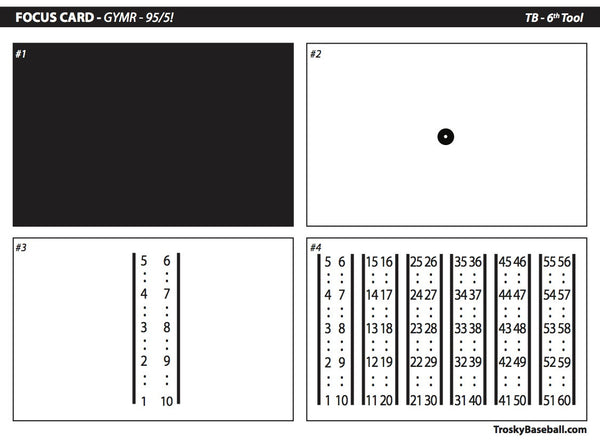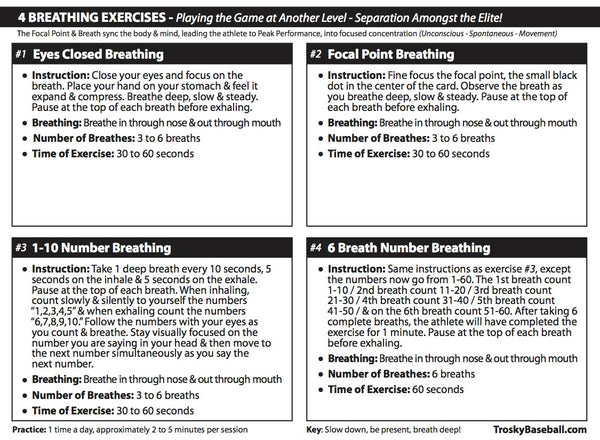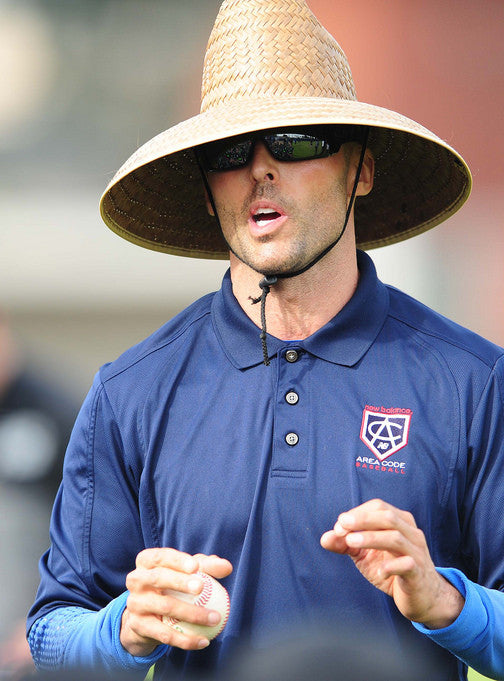Article: Get Your Mind Right ;The Hunter's Meditation.

Get Your Mind Right ;The Hunter's Meditation.
The War is Within, and Every Hunter Knows the Battle is Won in the Mind. Get Your Mind Right - 95/5!
THE WAR IS WITHIN
In the average 2-hour game, the ball is in flight for approximately 8 minutes, meaning for 1 hour and 52 minutes nothing is going on. The mind is vast, an expert at wandering. It’s capable of 40 visual images and thoughts per second. Within the vastness of the mind and the stillness of the game, the Hitter’s great challenge is his ability to be focused, totally committed, 1 pitch at a time, for the entire duration of the game!
Major League Hitters bat on average of 600 times per season. Within their 600 at-bats, over 300 times they’re defeated. Preparing for each at-bat, instinctually, hitter’s body are filled with adrenalin. The bigger the situation the more adrenalin they feel. With a high state of arousal and less then a 35% success ratio, hitters encounter the voice of doubt and negative emotions, emotions such as; stress, fear, worry, frustration, anger, anxiety and pressure. Negative emotions increase heart rate and create tension and when the heart rate increases and tension fills the body, the Hunter become physically challenged losing touch, feel and repeatability; vision and judgment is impaired, athleticism is lost, muscle and mental memory is forgotten and reaction time is delayed.
The Focal Point and Breath focuses the Hunter’s mind, slows his heartbeat, relaxes his body, and provides self control when he feels he’s lost it. Centering the mind and body, the Focal Point and Breath serves as the most powerful tool to reach peak performance. Get Your Mind Right!
MEDITATION (the Focal Point and the Breath)
The Hunter’s greatest skill is his ability to Get His Mind Right, hunting with unconscious spontaneous movement. Before the hunt, the Hunter Gets His Mind Right through the ritual of meditation. Meditating on a Focal Point and the Breath relaxes the Hunter and frees him from all distractions, quietly leading him into the zone, bringing him from the conscious mind (a mind preparing for competition) into the unconscious mind (a mind ready for competition), totally focused, totally present and totally committed to the Do!
The mind is a muscle too, and just like muscles need to be kept in shape, consistently trained, the Hunter’s mind must also be trained and developed. When the mind is trained through meditation, the focal point and breath become a valuable weapon. When meditation becomes habit, it becomes instinct (a natural inclination done without thought) and the Hunter becomes dangerous. The Hunter understands that the battle is won in the mind and that successful hitting is much more then having an expensive bat and a sweat swing. Get Your Mind Right!

Meditation: The practice of concentrated focus, to calm, to clear and to center mind and body.
OFF FIELD MEDITATION (a daily ritual)
- Off field meditation is practiced daily outside the lines using the Focus Card.
- Practice one time a day, approximately 2 to 5 minutes per session (or any amount of time preferred. The key is consistency).
- Pick a time daily to meditate. Write it into your calendar, making an appointment with yourself. Right before going to bed is typically the most convenient and productive time. Place your card next to your alarm, serving as a reminder before you crawl into bed (we have learned that is the easiest time to be consistent. It also gets your mind right for a good nights sleep).
- Throughout the day go to the breath and focal point anytime your mind isn’t right. For example:
- when you're upset and you need to regain control
- when everything speeds up and you need to slow down
- when you feel anxious and you need to relax
- when you’re distracted and you need to focus
- when a negative thought or emotion enters in and you need to be positive
- when you're under pressure and you need to be relieved
- Once the four breathing exercises are mastered, the Focus Card can be used as a reference. Without the card, the Hunter can simply meditate and incorporate visualization into the exercises.
ON FIELD MEDITATION (a daily ritual)
- On field meditation is done without the Focus Card. It’s practiced daily on field before, during, and after the game:
- Traveling to the game
- Walking into the stadium
- Stretching
- Sitting on the bench
- Anytime during the game when your mind isn’t right
- Before each AB
- Between pitches (the space between)
- Before practice starts
- Throughout the game go to the focal point and breath anytime your mind isn’t right.
- Before each game when entering the ball park, locate a focal point on the field that you can go to anytime you feel you are about to lose control.
- Focal Point examples; a spot on the scoreboard, the top of the flagpole, a shape on the fence, or find something small in the ground like a little pebble or a sun flower seed.

KEYS TO BREATHING
- Clear your mind (of the past and the future) and focus on the breath, totally present, and totally consumed.
- Breath deep and slow.
- Find a smooth rhythm and be steady with it.
- Pause at the top of each breath.
- Each breath should be smooth and even (on both the inhalation and exhalation)
- Inhaling: breath in through the nose (fill up your stomach with air)
- Exhaling: breath out of the mouth (release your stomach of air)
KEYS TO FOCAL POINT BREATHING
- While breathing, fine focus your eyes on the focal point you have chosen.
- Look at the focal point with relaxed focused eyes and breath.
INSTRUCTIONS
- The two-sided Focus Card is constructed of four simple meditation exercises. Notice each card is numbered in the top left corner.
- The front of the card lists the exercises.
- The back of the card lists the instructions to the exercises.
- Begin by reviewing the four exercises on the front of the card. After becoming familiar with the exercises, flip the card over and read the instructions.
- Now it’s time to start meditating. Begin with exercise 1.
- In each meditation session, practice all the four exercises, starting with exercise 1 and finishing with exercise 4.
- The exercises are brief and simple and can be done anytime and anywhere. It is best to pick a consistent time.
- Consider meditating when you wake up and or just before going to bed.
- Meditate anytime throughout the day when you’re faced with adversity.
- Once the four meditation exercises are learned, athletes have the freedom to create any breathing pattern they like. For example, the athlete can combine exercises 1 and 4, where the athlete closes their eyes and number breathes 1 to 60. Another variation would be to combine exercise 2 and 3 where the athlete does 1 to 10 number breathing while focused on the focal point. Be creative and have fun!
- It’s important for athletes to memorize the focus exercises and be comfortable doing them without the card because when they’re inside the lines competing in game situations, the card will not be accessible. The card simply serves as training wheels and like riding a bike, the training wheels come off once the skill is learned.
- Place your Focus Card in a convenient place that is visible and accessible. Consider placing it by your bed next to your alarm clock.
- Utilize the Focus Card as the blue print to guide you, to create consistency, and accountability. The focus card is much like a workout plan or routine that keeps an athlete regular and focused on the “What to Do!”
-
Card 1: Eyes Closed Breathing
- The Intent
- To clear the mind
- To be conscious of the breath
- To get focused and relaxed
- To get centered and to become present, completely separate from the outside world and totally consumed with the DO.
- The Intent
-
Card 2: Focal Point Breathing
- The Intent
- To get into the eyes and out of the head.
- To become visually connected.
- To get fine-focused.
- The Intent
-
Card 3: 1-10 Number Breathing
- The Intent
- To focus the mind and eyes using a number scale.
- To create rhythm in the breathing pattern.
- The Intent
-
Card 4: 6 Breath Number Breathing
- The Intent
- To put it altogether, mastering focused concentrated, centering mind and body.
- The Intent


THE CONCEPT
- For many years I’ve heard psychologist, speakers, and coaches talk about the power of the breath and the importance of meditation. It sounded interesting to me but I wasn’t convinced that it had an important place in the game.
- After 20 years of coaching and being around some of the top performers and trainers, I’m convinced! I now realize why so many top level athletes utilize the breath and say it’s their go to, to Get their Minds Right!
- If this is the case, then why do so few coaches teach meditation and breathing techniques to their players. I believe the answer is simple.
- To begin, many coaches aren’t convinced that meditation is worth spending valuable time on.
- Second, coaches feel it’s difficult to convince their players that meditation has great value.
- Third, because it is intangible, you can’t see it, and the unseen is hard to teach and hard to understand.
- Fourth, most coaches teach what they know and very few know and practice meditation.
- Lastly, it is hard to find a practical and simple meditation system that athletes can use and want to use as a daily discipline, and this is the main reason behind developing the Focus cards.
- The purpose of the Focus card is to take the confusion and uncertainty out of meditation and turn it into a daily practice that is impactful, enjoyable and simple.
THE WHY
- To teach athletes the value of the discipline of meditation. The ability to center mind and body at any and all times (95/5)
- To sync body & mind, leading the athlete into Peak Performance (Unconscious - Spontaneous - Movement – USM)
- For meditation to be beneficial it has to become a habit, practiced regularly as a ritual, apart of the athlete’s daily grind and lifestyle
- The mental game is the great separator and meditation is the source to get your mind right
- 212 Principal, 1° of separation, separation amongst elite
- Meditation enhances players to play the game at a different level
- Self control leads to body control. The ability to be in control when everything feels to be out of control.
- 95/5 - the game of baseball is 95% physical and 5% mental. The 5% mental control is the 95% physical
- The ability to be present. Success takes place in one Time-Zone only (1TZ), the present
- The difficulty of the game (baseball is a failure sport - the greatest winners are the greatest losers)
- The stillness of the game (baseball is the slowest game in the world - the ball is in flight for 5% of the game)
- The vastness of the mind (the mind is the master wandering - it’s capable of 40 visual images and thoughts per second)
- The human element (the voice of doubt resides within all athletes - adrenaline and tension is a byproduct of competition)
THE WHAT
- The Focus Card is a blueprint to achieve mental mastery. It’s like a written workout that an athlete would take with him to the gym to guide him through his training
- The Focus Card holds players accountable
- The Focus Cards are fun and challenging
THE GOAL
- To take the complex and make it simple
- To master the art of focus amongst both the game and life’s many distractions
- To enjoy life and to enjoy the game
- For athletes to enjoy daily meditation, to see the benefits and to embrace them
- For athletes to have a safe place to retreat to when things are out of control
- For meditation to become a habit
EXTRA NUGGETS: The Advantage in the Disadvantage!
Self Mastery - Both Inside and Outside the Lines (SM4)
The most productive way to master the mental game is outside the lines. Reason being, regularly throughout each day, athletes face intense emotions that increase heart rate, adrenalin, and tension. Emotions such as; frustration, fear, anger, worry, pressure and anxiety. These un-welcomed feelings replicate the emotions athletes face during the game, the negative emotions that often take them out of the game.
Adversity athletes face in their daily lives provides a tremendous opportunity to take advantage of. Taking advantage, meaning athletes should utilize the adversity as a tool and a practice ground to develop mental toughness, a mental toughness which can be ultimately translated into how they respond to adversity between the lines. It is very difficult to create competitive game like tension and adrenaline and our daily stresses of life do this.
My definition of success is, “The highest number of repetitions at game focus, game speed, and game challenge!” Within this definition, if an athlete only practices how they respond to adversity during games, they will never master themselves or master the game. Reason being, athletes don’t play enough games to master the skill of Self Mastery. This is the secret to Self Mastery and why it is so important take advantage of the moments throughout the day when an athlete feels they’re losing control and their mental state is being challenged.
Self-mastery is the most difficult task for an athlete to master and practicing is the only way to become good at it, therefore, if an athlete practices getting their mind right throughout each day, they will eventually become masters of the mind both inside and outside the lines.
Athletes develop the habit and skill of mental focus, mental toughness, self discipline and self control by going to the focal point and breath anytime throughout the day when their mind isn’t right. This is the key, the great separator! GYMR - 95/5!
Real Life Situations Athletes Face Daily to Practice GYMR!
- When you’re late and in a hurry for something very important to you!
- When things aren’t working out as planned!
- When things don’t go your way!
- When things go wrong!
- When you’re asked to do something you really don’t want to do!
- When you’re treated unfairly!
- When you lost your sense of direction and feel helpless!
- When you’re disappointed in yourself or in others!
Cost and Importance: The greater the cost and the higher the level of importance that is placed on something, ultimately creating the athlete’s Experience - Intent – Intensity.
Success = The highest number of repetitions at game focus, game speed, and game challenge!
Self-Mastery = Being in control of oneself regardless of situation or circumstance!
Read Nate Trosky's bio here: http://troskybaseball.org/about





